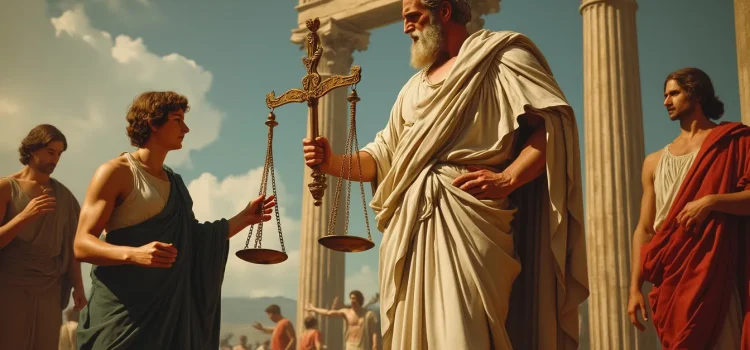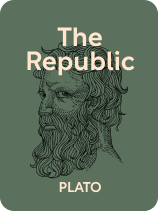

This article is an excerpt from the Shortform book guide to "The Republic" by Plato. Shortform has the world's best summaries and analyses of books you should be reading.
Like this article? Sign up for a free trial here.
What does true justice look like? Is it possible for justice to be inherently good, rather than just a means to an end?
In The Republic, Plato explores these questions through a series of dialogues. The ancient philosopher presents his idea of justice, challenging conventional wisdom and proposing a radical new way of looking at an age-old concept.
Read more to understand Plato’s concept of justice as presented in The Republic.
Plato’s Concept of Justice
Plato’s concept of justice is laid out in Books I and II of The Republic. He starts the work by establishing his main thesis: Justice, or acting morally, is good for its own sake. He opens with the philosopher Socrates and his student Glaucon taking a trip to the port of Athens, which gets interrupted when the wealthy merchant Cephalus demands they visit him. After a brief discussion on old age and wealth, Socrates questions Cephalus’s perspective and the old man departs. Then, Socrates and the remaining young men discuss the definition of justice.
(Shortform note: Socrates was an ancient Athenian philosopher and Plato’s primary philosophical mentor and teacher. In Plato’s works, he’s almost always the primary character delivering Plato’s philosophical ideas. However, scholars are uncertain of how closely Plato sticks to the teachings of Socrates—Socrates never wrote any philosophy of his own, and historical accounts of him besides those of Plato are relatively scarce.)
The discussion of justice contains the following points:
- A conventional definition of justice that proves insufficient
- A definition of justice as “might is right” that describes justice as a tool for self-interest
- The challenge to Socrates, which sets up Plato’s thesis and how he’ll defend it
The Conventional Definition of Justice
Cephalus’s son Polemarchus opens the discussion of justice with a relatively conventional definition: Justice means honoring your contracts, helping your friends, and harming your enemies.
| The Status Quo in Athens Some scholars argue that Cephalus and Polemarchus represent the Athenian status quo, including its moral complacency and instability. Cephalus represents Athenian elites: old, wealthy, and not very interested in moral and philosophical discussion. After all, he leaves as soon as his opinion on justice is challenged. And while Polemarchus is more willing to discuss justice, his definition still relies on a few simple rules rather than a deeper examination of the concept. Therefore, the two of them are fine with the current moral state of Athens. Historical context shows why these two characters represent the instability of the status quo: Cephalus emigrated to Athens to make his fortune, meaning he prioritized wealth over the rights and duties of full citizenship (which was only given to native Athenians). In addition, their family was ruined a few years before Plato wrote The Republic—Polemarchus was executed and Cephalus’s other son Lysias was exiled when Athens fell during the Peloponnesian War. This shows that the status quo they represent is far less stable than it appears. |
Refuting the First Definition
Socrates disagrees with this first definition of justice. He notes that, according to this definition, you could mistake a friend for an enemy and hurt the wrong person—or vice versa—and it would still count as just. He also suggests that a truly just person doesn’t harm anyone. A just person aims to make the world and everyone in it more just. So while they might cause someone pain—punishing them for a crime, for example—they’ll only do so if that pain helps their enemy become a better, more just person.
(Shortform note: Scholars argue that this refutation is less about shutting Polemarchus down entirely and more about proving his view insufficient to prompt further discussion. This is a common trend in Platonic dialogues: Socrates will ask for a definition, receive a limited or specific answer, and then show that the truth is more complicated. For example, in Plato’s dialogue Laches, Socrates asks Laches for a definition of courage. The first definition Laches gives is standing and fighting instead of running away—a specific definition that only applies to war. Socrates’s rebuttal broadens the topic from “what is a brave thing to do” to “what is bravery.”)
The Second Definition of Justice: Might Makes Right
After Socrates refutes the first definition of justice, philosopher and rhetorician Thrasymachus jumps into the conversation with his definition: Justice is whatever benefits the strong. In other words, justice is a tool powerful people use for their self-interest. The powerful define justice and morality in a way that gets them what they want, and the weak obey it because they have no other choice. Therefore, the powerful aren’t bound by the same standards of morality as the weak—they can do whatever they want, so long as they’re strong enough to get away with it.
(Shortform note: Thrasymachus is a recurring character in Platonic dialogues and represents the broader intellectual tradition of Sophistry. Sophists were professional orators and rhetoricians who taught techniques of persuasion to Athenian elites. Persuasion held significant political power in this society where everyone voted on political decisions. Sophists prioritized winning arguments over any ideological commitment or belief, as it was their main method of getting business. Thrasymachus himself was a sophist, and his self-interested, cynical definition of justice is emblematic of his overall selfish and cynical approach to philosophical discourse.)
The Challenge to Socrates
Socrates offers several arguments against Thrasymachus’s view of justice, but Glaucon and his brother Adeimantus find them unsatisfactory. They challenge Socrates to prove Thrasymachus wrong by showing that justice is good for its own sake—in other words, justice has inherent value beyond a way for people to get what they want.
To frame this challenge, Glaucon and Adeimantus play “devil’s advocate” by offering an argument similar to Thrasymachus’s. Then, they provide the specific terms of the challenge.
(Shortform note: Most scholars agree that Socrates initially makes weak arguments against Thrasymachus on purpose. Instead of actually trying to refute Thrasymachus, Socrates is trying to get him to stop talking—and to “bait” Glaucon and the other more intellectually honest young men into a deeper discussion. This provides a contrast between Thrasymachus and Socrates: The former is more interested in winning arguments to advance his career and reputation, while the latter is more interested in teaching others and seeking wisdom even if it makes him look bad.)
The Case for Injustice
Glaucon and Adeimantus make the case that justice is good only because it provides other benefits. Glaucon and Adeimantus argue people aren’t just because they want to be. Instead, they follow the rules of society and act justly to avoid the consequences of being unjust: a bad reputation, trouble with the law, judgment in the afterlife, and so on. Therefore, justice isn’t inherently good.
To further illustrate this point, Glaucon cites the myth of Gyges, a story about a man who finds a ring that turns him invisible. Gyges then uses this ring to rob and kill his way to power and wealth. Glaucon argues that anyone with this ring would use it to commit unjust deeds in pursuit of their selfish desires because there would be no consequences for their actions.
| The Thematic Importance of Gyges Scholars suggest that the myth of Gyges sets up many of the themes discussed throughout The Republic via dramatic context. Specifically, they note how rings were sometimes used as metal currency in ancient Greece, meaning Gyges symbolically derives his power from money—power that allows him to commit tyrannical acts. As we’ll see, Plato revisits the danger of wealth as a corrupting force throughout The Republic. In addition, the myth of Gyges is the work’s first mention of visibility and invisibility, which become central to Plato’s understanding of the world. Plato later describes the philosopher as having the unique ability to see and reveal what was once invisible—abstract ideas and concepts—meaning they’re uniquely suited to reveal Gyges and therefore take away his power. Consider how ideas established later in The Republic add depth to the meaning of the myth of Gyges. |
The Terms of the Challenge
To define their challenge to Socrates, Glaucon and Adeimantus invent two hypothetical men:
- A perfectly unjust man who everyone believes is just, and who has all the benefits of being seen that way: He’s greatly respected and admired, is in no legal trouble, and has a great deal of wealth and power.
- A perfectly just man who everyone believes is unjust, and who faces all the consequences of being seen that way: He’s despised, imprisoned, and poor.
The first man is unjust, but gains all the benefits of being just. On the other hand, the second man is just, but it provides him no benefits in life. If Socrates can prove that the second (just) man lives a preferable life to the first (unjust) man, he’ll prove that justice is good not because of the benefits it provides but for its own sake.
(Shortform note: Some scholars argue that the challenge to Socrates is flawed because it shifts the goal of the argument. Previously, Glaucon and the others wanted Socrates to prove that justice was inherently good. But by juxtaposing the perfectly unjust and perfectly just man, they seem to be asking Socrates to prove more than that—instead, they want him to prove that the inherent goodness of justice outweighs the benefits it provides. This suggests that Socrates had the opportunity to take issue with the challenge itself, but instead of attacking Glaucon’s argument he decides to present the strongest version of his own.)
Exercise/Discussion
If you had the ring of Gyges and could turn invisible, would you use it to get away with misbehavior or morally dubious acts? Why?

———End of Preview———
Like what you just read? Read the rest of the world's best book summary and analysis of Plato's "The Republic" at Shortform.
Here's what you'll find in our full The Republic summary:
- Plato’s concept of justice
- Why living a moral life is good for its own sake
- How later philosophers interpreted and responded to the ideas in The Republic






